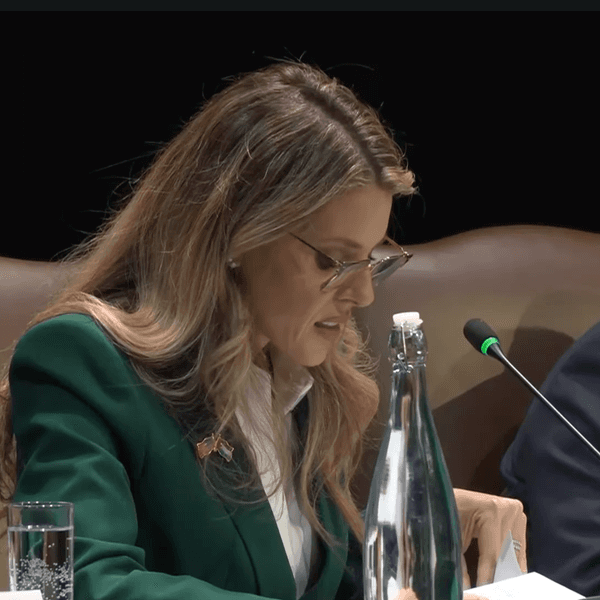House lawmakers voted overwhelmingly Wednesday to approve legislation directing the U.S. Department of Education to consider a dubious definition of antisemitism, despite warnings from Jewish-led groups that the measure speciously conflates legitimate criticism of the Israeli government with bigotry against Jewish people.
House members approved the
Antisemitism Awareness Act—bipartisan legislation introduced last year by Reps. Mike Lawler (R-N.Y.), Josh Gottheimer (D-N.J.), Max Miller (R-Ohio), and Jared Moskowitz (D-Fla.) in the lower chamber and Sen. Tim Scott (R-S.C.) in the Senate—by a vote of 320-91.
Both progressive Democrats and far-right Republicans opposed language in the bill. The former objected to conflating criticism of Israel with hatred of Jews, while the latter bristled at labeling Christian scripture—which posits that Jews killed Jesus—as antisemitic.
"Antisemitism is the hatred of Jews. Unfortunately, one doesn't need to look far to find it these days. But the supporters of this bill are looking in the wrong places," Hadar Susskind, president and CEO of the Jewish-led group Americans for Peace Now, said following Wednesday's vote.
"They aren't interested in protecting Jews," he added. "They are interested in supporting right-wing views and narratives on Israel and shutting down legitimate questions and criticisms by crying 'antisemite' at everyone, including Jews" who oppose Israel's far-right government.
"With this disingenuous effort, House Republicans have failed to seriously address antisemitism," Susskind added. "I hope the Senate does better."
The legislation—officially H.R. 6090—would require the Department of Education to consider the International Holocaust Remembrance Alliance (IHRA) Working Definition of Antisemitism when determining whether alleged harassment is motivated by antisemitic animus and violates
Title VI of the Civil Rights Act of 1964, which "prohibits discrimination on the basis of race, color, and national origin in programs and activities receiving federal financial assistance," including colleges and universities.
Lawler's office
called the proposal "a key step in calling out antisemitism where it is and ensuring antisemitic hate crimes on college campuses are properly investigated and prosecuted," while Gottheimer emphasized that "the IHRA definition underscores that antisemitism includes denying Jewish self-determination to their ancestral homeland of Israel... and applying double standards to Israel."
Critics say that's the trouble with the IHRA working definition: It conflates legitimate criticism and condemnation of Israeli policies and practices with anti-Jewish bigotry, and forces people to accept the legitimacy of a settler-colonial
apartheid state engaged in illegal occupation and a "plausibly" genocidal war on Gaza.
As the ACLU noted last week in a letter urging lawmakers to reject the legislation:
The IHRA working definition... is overbroad. It equates protected political speech with unprotected discrimination, and enshrining it into regulation would chill the exercise of First Amendment rights and risk undermining the Department of Education's legitimate and important efforts to combat discrimination. Criticism of Israel and its policies is political speech, squarely protected by the First Amendment. But the IHRA working definition declares that "denying the Jewish people their right to self-determination, e.g., by claiming that the existence of a state of Israel is a racist endeavor," "drawing comparisons of contemporary Israeli policy to that of the Nazis," and "applying double standards by requiring of [Israel] a behavior not expected or demanded of any other democratic nation" are all examples of antisemitism.
Jewish Voice for Peace Action
slammed what it called IHRA's "controversial and dangerous mis-definition that does not help fight real antisemitism and is only a tool for silencing the movement for Palestinian rights."
"The Israeli government's bombardment and siege of Gaza has killed over 34,000 people in six months," the group said on social media. "Congress must stop attacking the students and faculty members who are trying to stop this genocide, and instead focus on ending U.S. complicity in Israel's attacks."
Israel's Gaza onslaught has sparked a wave of nonviolent student-led protests across the United States and around the world. Some of these protests have been violently repressed by police, while anti-genocide activists including Jews have been branded "antisemitic" for condemning Israeli crimes or defending Palestinians' legal right to resist them.
Americans for Peace Now said that while it is "deeply concerned about the escalating antisemitism in the United States and globally," the legislation "poses a significant threat to free speech and open discourse."
"Equating criticism of the Israeli government with antisemitism is a tactic used to stifle important discussions on Israeli policies and actions, thereby hindering the broader effort to combat true instances of hatred and discrimination against Jewish communities," the group added.
Kenneth Stern, director of the Bard Centre for the Study of Hate and lead drafter of the IHRA working definition,
warned years ago that "Jewish groups have used the definition as a weapon to say anti-Zionist expressions are inherently antisemitic and must be suppressed."
"Imagine if Black Lives Matter said the most important thing the [Biden] administration could do to remedy systemic racism is adopt a definition of racism, and that definition included this example: opposition to affirmative action," Stern wrote in 2020.
"Obviously, sometimes opposition to affirmative action is racist and sometimes it is not," he added. "The debate about systemic racism would be changed to a free speech fight, and those with reasonable concerns about affirmative action correctly upset that the state was branding them racist."




